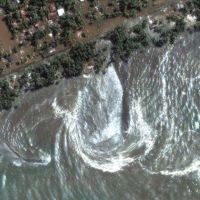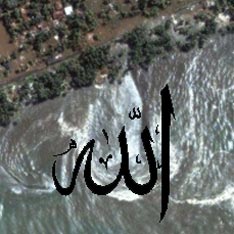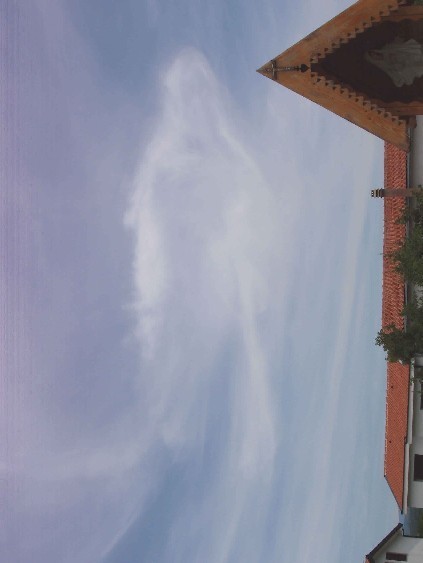
|
|
|
|
||||||||
|
|
||||||||||
|
|
|
The Glorious Name "ALLAH" Appeared on the Waves of Tsunami! : A response
Even In this 21st century, some people like to interpret facts, reports, events, perceptions, etc., according to what one would like to be the case rather than according to the actual evidence. We skeptics, like to term such tendency as "wishful thinking". If someone done intentionally and without regard for the truth, the approach is called misinterpretation of fact, falsification or perversion of the truth. If, however, done unconsciously but deliberately, wishful thinking may lead to Self-deception which is another way to justify false beliefs to gullible mind. The interesting discussion on wishful thinking was initiated in Mukto-Mona last week when our friend Mr. Mohiuddin, a devout Muslim member sent an email to the forum claiming Tsunami wave, which literally created an havoc in this planet, bore Merciful Allah's name:
Though regular news media ignored such "crap news" for the reasons which are very obvious to a rationalist, the "important" news has indeed appeared several Islamic web-sites/newspapers as well as some "neutral" dailies and online papers such as Daily Star (Bangladesh), Malay Mail (Malaysia), Independent Online (South Africa), China Post (Taiwan), Sydney Morning Herald and many others: In response
to Mohiuddin's post,
Jahangir Meherul Responds (massage# 22200):
Our member Mahbub Kamal (massage# 22207):
And Lastly Nondini (massage# 22282)::
Again, if a reader carefully observe the picture with his/her skeptic mind he/she would notice how cleverly/wishfully someone interpreting events according to what gullible mass would like to believe. I myself didn't find any "exact match" with "Allah" in that picture, though it's true there might have been some "accidental resemblance". let us observe the picture carefully once again:
Now, Do the black lines (i.e. "Allah" written in Arabic) really give an exact similarity in appearance with the white lines in the picture of the Tsunami waves? Any human being after observing the above picture with a rational mind would probably say- "no". However, a believer's mind does not work in such a way. A believer like Mohiuddin suffers from a "True-believer syndrome" which is an expression coined by M. Lamar Keene, a reformed "phony psychic" to describe an apparent cognitive disorder characterized by believing in the unrealistic fantasies:
Sometimes such "syndrome" is so obvious for them that "no amount of logic can shatter a faith." One can also ponder whether Mr. Mohiuddin and his cohorts would consider following "Natural Flukes" as "signature of God" as well. For example, one may ask, what will be his answer if one devout Hindu forwards a picture to him which shows a Hindu symbol of "Omm" appears apparently on this cow:
Even sex-maniac Bhagwan Rajneesh who was advocacy of sex as a path to enlightenment, could have brought the following picture of carrot as a sign of "sex-maniac God" (apology to general readers if the picture appears to be offensive):
Obviously, this time Mr. Mohiuddin will act like other rational beings and will be able to understand that "Flukes do happen". The reason is obvious; those pictures do not bear the name of Allah the Islamic God, but the waves of Tsunami does! This leads us to conclude that Mr. Mohiuddin and his Muslim brothers who believe in "Islamic miracles" could not actually come out from their confirmation bias! (Confirmation bias refers to a type of selective thinking whereby one tends to notice and to look for what confirms one's own beliefs, and to ignore, not look for, or undervalue the relevance of what contradicts one's beliefs). So, why do people believe weird things? Of course, Ignorance can be the main reason many people believe "such crap". Religion, myths, superstitions, cults, New Age ideas, and all sort of nonsense miracles have been presented every nook and cranny of both popular and high culture year after year. So, even in this age of science, most people are unaware the real scientific facts behind "Barmuda Triangle", "psychokinesis" or "Nostradamus story". According to recent polls, in US about 82 percent are convinced of the reality of heaven (and 63 percent think they're headed there after death); 51 percent believe in ghosts; but only 28 percent are swayed by the theory of evolution. Ignorance is really a bliss here. Besides this, "more than any other, the reason people believe weird things," says Michael Shermer, in defining the term Credo Consolans in his book "Why people Believe Weird Things" - "is because they want to. . . .It feels good. It is comforting. It is consoling." Secondly, weird beliefs offer "immediate gratification." People like weird beliefs because they are simple. Weird beliefs also satisfy the quest for significance: they satisfy our moral needs and our desire that life be meaningful. Finally, he says, people believe weird things because weird things give them hope (Michael Shermer, Why People Believe Weird Things: Pseudoscience, Superstition, and Other Confusions of Our Time, page 273-278). Our forum moderator Jahed Ahmed showed his profound astonishment by the "gullible tendency" of seemingly educated Muslims like Mr. Mohiuddin. Again, Mr. Mohiuddin is not alone in his credulous journey. One can cite examples of William Dembski, Philip Johnson, Hugh Ross, Michael Behe, Frank Tipler. By the criteria that counts in the academy (for publishing papers in journals, books etc) they are really smart. one can ponder why would someone with such talent surrenders to gullibility of "intelligent design", "irreducible complexity", "anthropic principle", "fine tuning" etc and at the end chasing the chimera of proving what is inherently improvable- God? Also we have seen, many "smart people" are overconfident enough to think that if they cannot explain something, it must be inexplicable and therefore a true mystery of the paranormal. let us consider our friend Dr. Ali Sina who wrote an article "What it Takes to be a Rationalist" on the occasion of celebration of "Rationalists' Day" where he told us about how he was overwhelmed by a globe of orange light near hovering over his sleeping sister. Brent Meeker, a fellow skeptic put a rational explanation of Sina's miracle in his article, "Dogmatism of the Paranormalist", explaining: "Had he (Ali Sina) spent even a few minutes searching the literature he would have found that a globe of orange light is what ball lightning looks like. It often moves swiftly after hovering." However, Ali objected to Brent's explanation of the orange globe of light in his later article because he believed it 'behaved intelligently'. If he could think critically as he does in debunking Islamic myths, he could have searched more rather just sticking in paranormal explanation. I consider Dr. Ali Sina as one of the leading scholars debunking Islamic myths and I always try to maintain a friendly relationship with him, yet I critique some of Ali's ideas regarding paranormal issues in some of my previous articles. For example, Ali Sina wanted to believe in Van Praagh's psychic power without critically examining it. It can be very possible that Ali does not have any expertise in such field like Randi or Shermer have. Yet, his overconfident mind declares Van Praagh as a psychic. An amateur archeologist, in the same way, declares that because he cannot figure out how the pyramids were built, they must have been constructed by space aliens. Even those who are more reasonable at least think that if the experts cannot explain something, it must be inexplicable. Feats such as the bending of spoons, firewalking, or mental telepathy are often thought to be of a paranormal or mystical nature because most people either cannot explain them. When they are explained, most people respond, "Yes, of course" or "That's obvious once you see it." Firewalking can be a case in point. People used to speculate endlessly about supernatural powers over pain and heat, or mysterious brain chemicals that block the pain and prevent burning. The simple explanation is that the capacity of light and fluffy coals to contain heat is very low, and the conductivity of heat from the light and fluffy coals to your feet is very poor. As long as you don't stand around on the coals, you will not get burned. Also it takes few minutes or so for getting our skin burnt in a particular heat, the atmosphere i.e. the breeze, coolness, and the dampness. Sometimes a trick is deliberately done to put rock salt on the hot coal bed which attracts moisture and so it restricts sudden burn if one walks within 3 seconds. Another factor should not also be overlooked which is generally done in places of worship is that the religious gurus wash their feet and body with lots of water in front of the hot coal bed and goes around the hot bed praying many times when their feet get a coating of wet clay and until the water in the clay gets evaporated, they won't get burnt. Mukto-Mona Rationalism page contains some articles with rational explanation of such "alleged miracles"; the following article can be of readers interest: Again, There can be many genuine unsolved mysteries, and infact there are (for example knowledge about dark matter, dark energy, conceptualization of eleven dimension in string theory and many others are still mystery) and it is completely okay for us to say, "We haven't yet solved all but someday perhaps we will." The problem is that most of us find it more comforting to have certainty, even if it is premature or absurd, than to live with unsolved or unexplained mysteries. Skepticism or debunking, according to Stephen Jay Gould, often receives the bad rap reserved for activities - like garbage disposal - that obviously must be done for a safe and sane life, but seem either unglamorous or unworthy of overt celebration. Yet the activity has a noble tradition, from the ancient Charvakas and Greek coinage of "skeptic" to Carl Sagan, Victor Stenger, Mark perakh, Paul Kurtz, Maichael Shermer, James Randi and Prabir Ghosh's work. This trend should be carried on. I would like to end my piece by quoting Natalie Angier:
Thanks to all who came with rational explanation of Tsunami-miracle in Mukto-Mona. January 15, 2005 References:
|
|
|
||||||
|
|
|
|
||||||||
|
|
||||||||||





